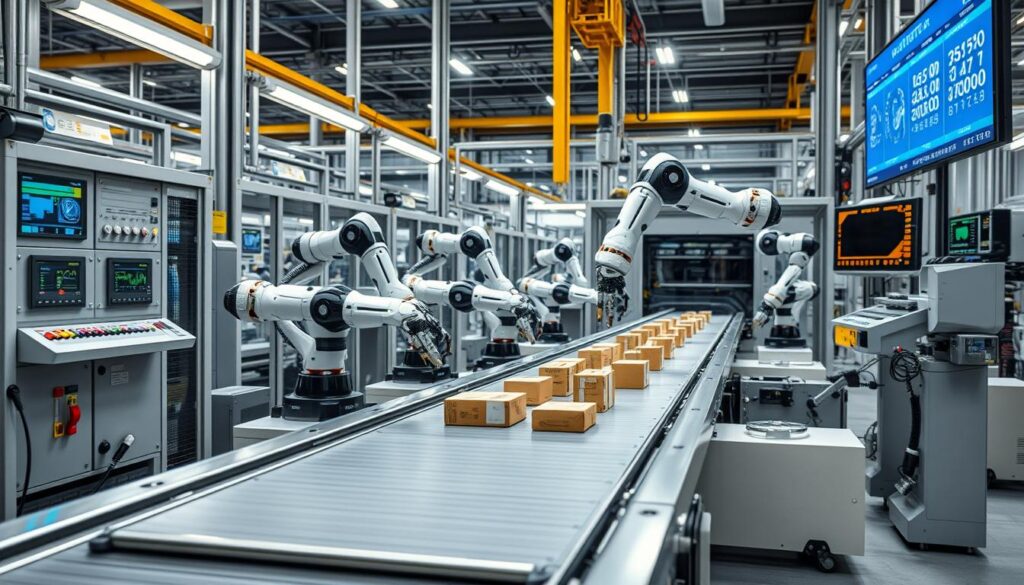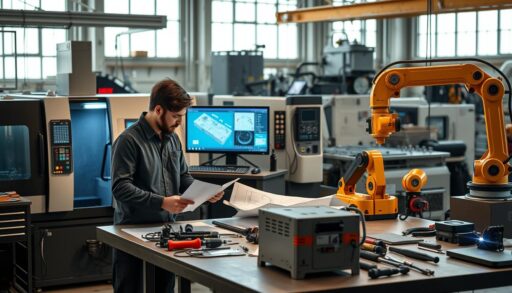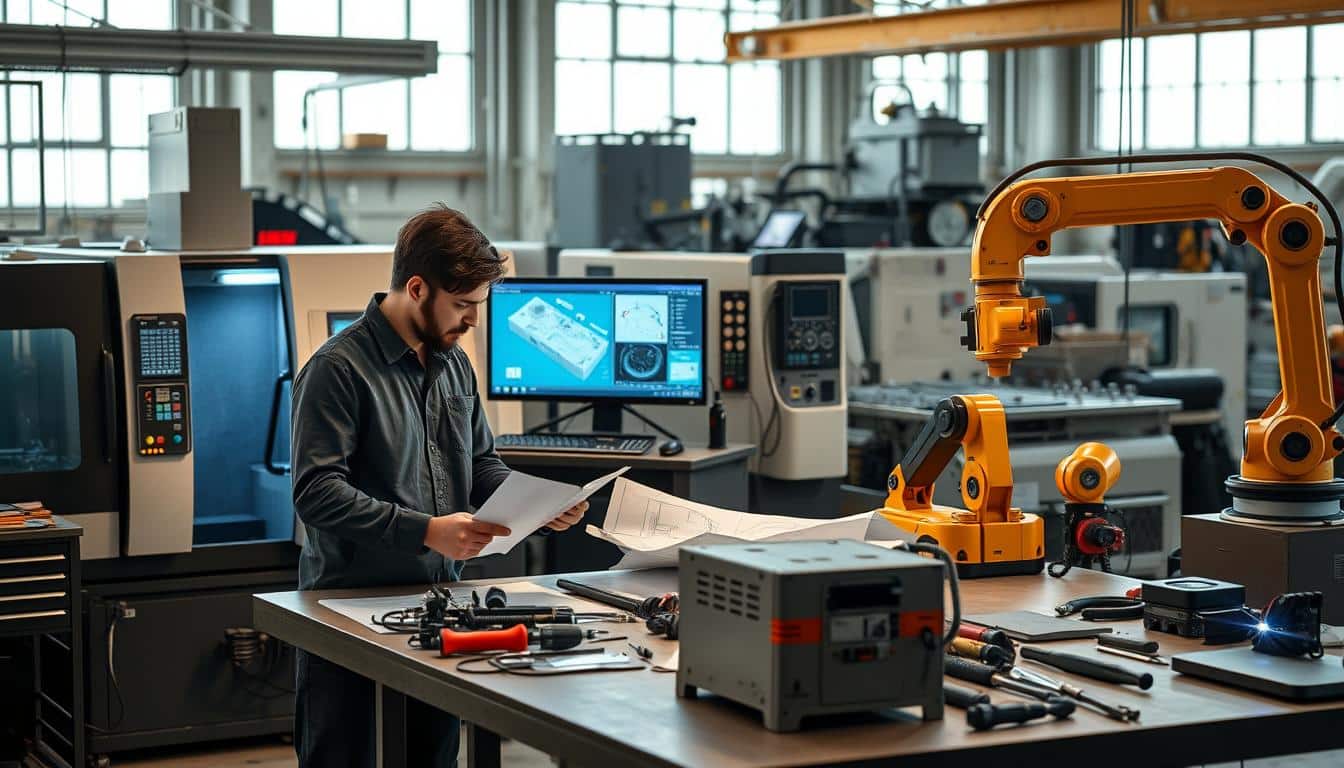The field of industrial technology needs a wide range of skills. These skills help navigate system design, process optimization, and new technologies. As the industry grows, industrial technologists must have a broad skill set. This includes technical knowledge, analytical skills, and the ability to work well with others.
This article will look at the key skills for a successful career in industrial technology. It aims to guide those who want to excel in this fast-changing field.
Key Takeaways
- Industrial technology careers demand a versatile skill set encompassing technical, analytical, and interpersonal abilities.
- Proficiency in system thinking, optimization, and data-driven decision-making are crucial for success.
- Technical skills in computer-aided design, process engineering, and industrial automation are highly valued.
- Project management and organizational skills are essential for coordinating complex industrial projects.
- Emerging trends in data analytics, automation, and sustainability are shaping the future of industrial technology careers.
System Thinking and Optimization Capabilities
At the heart of industrial technology is the ability to see the big picture. Technologists must understand how each part of a system works together. They use systems analysis and design to find ways to make things better, cheaper, and higher quality.
Knowing lean manufacturing principles is key. These principles aim to cut waste and add more value for customers. This is essential in the field.
Systems Analysis and Design
Organizations deal with many connections, like partners, customers, rivals, and staff. Systems thinking helps leaders manage these complex relationships. It uses tools to show how things are connected.
By looking at money flows, supply chains, and how customers interact, leaders can learn and adapt. This helps the organization grow.
Operations Research and Optimization Techniques
Systems thinking looks at how different parts of a business work together. It sees how actions can affect other parts in unexpected ways. Operations research and optimization techniques help technologists make things better.
These techniques focus on improving operations in a big way. They help change structures, skills, and culture in a system.
Lean Manufacturing Principles
Feedback loops help change happen in organizations. But, surprises can mess up plans. Lean manufacturing principles aim to reduce waste and increase value for customers.
These principles encourage teamwork and show different views through group work. Systems thinking helps design strong, adaptable organizations, even when things are tough.
“Systems thinking requires crossing departmental silos to formulate coherent solutions scaling up and down integrated operations.”
Technical Proficiency in Industrial Technologies

Industrial technologists need a solid base in engineering and technical skills. They must know CAD and CAM software well. They also need to understand how to improve industrial processes and work with automation and control systems. These technical skills help them create and refine systems and processes.
Computer-Aided Design (CAD) and Manufacturing (CAM)
Knowing CAD and CAM software is key for industrial technologists. These tools help them make detailed designs and improve the manufacturing process. They use CAD and CAM to make product development better and production more efficient.
Process Engineering and Improvement
Understanding how to improve industrial processes is vital. They must analyze current processes, find ways to make them better, and implement changes. This includes using process engineering and lean manufacturing to boost efficiency and quality.
Industrial Automation and Control Systems
Industrial technologists also need to know about industrial automation and control systems. These technologies help make production smoother, cut down on mistakes, and boost efficiency. Knowing how to program and fix these systems is important for keeping manufacturing advanced.
“Technological development in industry involves introducing new tools and techniques, mechanizing production processes, enhancing technical performance capabilities, and utilizing new scientific ideas.”
By getting good at these technical skills, industrial technologists are key to innovation and success. They help make industries more productive and competitive.
Data Analytics and Decision-Making Skills

In today’s world, making decisions based on data is key. Industrial technologists need to be good at analyzing numbers. They must know how to collect, process, and understand data. This includes knowing statistical analysis and quality control techniques.
Using simulation modeling and analysis tools is also important. These tools help predict trends, solve big problems, and make the best use of resources.
Statistical Analysis and Quality Control
Good data analytics starts with knowing statistics. Industrial technologists should be able to spot patterns and trends in data. This skill helps them make better decisions that improve quality control and make things run smoother.
Simulation Modeling and Analysis
Being able to make and analyze simulation models is a big plus. With simulation modeling, technologists can see how complex systems will act. They can try out different scenarios and find the best way to use resources. This helps lower risks, cut costs, and make better choices.
| Benefit | Percentage of Respondents |
|---|---|
| Faster and more effective decision-making | 56% |
| Improved efficiency and productivity | 64% |
| Better financial performance | 51% |
| Identification and creation of new product and service revenue | 46% |
| Improved customer acquisition and retention | 46% |
| Better customer experiences | 44% |
| Gaining a competitive advantage | 43% |
The benefits of data analytics are clear, as shown by the statistics above. By mastering these skills, industrial technologists can make better decisions, improve how things work, and stay ahead in the market.
“Effective decision-making is the most prominent benefit of data analytics, according to 57% of companies.”
Project Management and Organizational Abilities

Successful industrial technologists have top-notch project management skills. They lead projects to boost efficiency and productivity. They plan, execute, and manage projects well, using time management, resource allocation, and talking to stakeholders.
They also have strong organizational abilities and pay close attention to details. This ensures projects are done on time, within budget, and meet the required standards. These skills are key in the fast-changing world of industrial technology.
The job of project management is growing fast, with a 6% increase expected over the next decade. This is double the growth rate for all jobs. With a median salary of $95,370 in 2022, it’s a promising career for those skilled in both technology and organization.
The Bureau of Labor Statistics shows that project management specialists earn different salaries in various industries. In 2022, they made between $84,310 in construction and $104,930 in finance and insurance. This highlights the importance of these skills in many sectors.
“Project management is a key competency for industrial technologists, who often lead initiatives aimed at improving efficiency and productivity.”
To keep up, industrial technologists need to improve their project management and organizational skills. They should use modern tools and methods like Agile and Scrum. This helps them work more efficiently and achieve better results.
Henry Rogers, a project management teacher at El Camino College Business Training Center, says these skills are more important than ever. The global supply chain disruptions and the need for agility make them crucial for companies today.
Industrial Technology Trending Skills for 2024

As the industrial world changes, tech experts need to keep up. In 2024, skills like advanced data analytics, automation, and robotics, and knowing about the environment will be key. These skills are vital for success.
Advanced Data Analytics
Learning advanced data analytics helps tech experts make better decisions. The World Economic Forum says AI and Machine Learning jobs will grow by 40% in five years. This makes it one of the fastest-growing careers.
AI/ML jobs are hard to find but pay well, with salaries over USD $142,600. Gartner notes this.
Automation and Robotics Integration
Using automation and robotics is important for making production better. With more companies using cloud services, skills in this area are in demand. Cloud skills are hard to find but pay well.
Environmental and Sustainability Acumen
Knowing about the environment helps tech experts make industries more sustainable. Gartner says cybersecurity is a big priority in 2024. Python is seen as a crucial skill for companies of all sizes.
Also Read: How Is Financial Technology Improving Personal Finance Management?
“Mastering these skills will enable industrial technologists to leverage data-driven decision making, optimize production processes through automation, and contribute to the development of sustainable industrial practices.”
Conclusion
The field of industrial technology needs a mix of skills. These include technical know-how, analytical thinking, and the ability to work well with others. By honing these skills, future industrial technologists can excel in this fast-changing field.
Skills like system thinking, data analysis, and project management are key. Mastering these will help individuals succeed in industrial technology. They will be able to drive innovation and improve industrial processes.
The need for skilled industrial technologists is growing. With advancements in science and technology, the demand is increasing. Innovations like cell phones, electric vehicles, and solar power are changing the game.
These changes highlight the importance of combining cutting-edge tech with industry-specific knowledge. This is crucial for progress and meeting society’s evolving needs.
For those looking into a career in industrial technology, the future is bright. Developing a deep understanding of the field and keeping up with trends opens doors. The ability to think critically, analyze data, and manage projects is highly valued.
As the field continues to evolve, those with the right skills will lead the way. They will shape the future of this vital and dynamic industry.
FAQs
Q: What skills are essential for careers in industrial technology?
A: Essential skills for careers in industrial technology include problem-solving, critical thinking, technical proficiency, and knowledge of industrial systems. Familiarity with machinery and technology used in manufacturing processes is also crucial.
Q: What can I expect from an industrial technology program?
A: An industrial technology program typically covers a variety of subjects, including engineering technology, electronics, and hands-on experience with industrial machinery. These programs prepare students for various job titles in industrial settings.
Q: What types of industrial technology careers are available?
A: Careers in industrial technology include positions such as industrial technologist, technician, and engineering positions. Graduates can find work in sectors like manufacturing, aviation, and other engineering and manufacturing technology fields.
Q: Do I need a specific degree in industrial technology to pursue this career?
A: While a bachelor’s degree in industrial technology is common, there are also degree options like an associate of applied science degree that can prepare you for technician roles. A degree in industrial technology can provide a strong foundation for various job titles.
Q: What is the difference between an industrial engineer and an industrial technologist?
A: An industrial engineer focuses on optimizing systems and processes, often taking on a more theoretical role, while an industrial technologist applies practical knowledge to implement technology and improve production efficiency in industrial settings.
Q: Are there scholarship opportunities for students in industrial technology programs?
A: Yes, many institutions offer scholarships for students pursuing a degree in industrial technology. These scholarships can help reduce tuition costs and support students who want to learn and specialize in this field.
Q: How does a bachelor’s degree in industrial technology differ from a bachelor of science in industrial?
A: A bachelor’s degree in industrial technology often emphasizes practical skills and hands-on training, while a bachelor of science in industrial may focus more on theoretical concepts and scientific principles related to engineering and technology.
Q: What kind of technology is used in industrial settings?
A: Technology used in industrial settings includes automation tools, robotics, computer-aided design (CAD) software, and advanced machinery. Understanding how to operate and maintain this technology is essential for success in industrial technology careers.
Q: What qualities should I have if I want to learn more about industrial technology?
A: If you want to learn more about industrial technology, you should have a strong interest in science and engineering, good analytical skills, and a willingness to engage in hands-on learning. Being detail-oriented and adaptable can also be beneficial.


